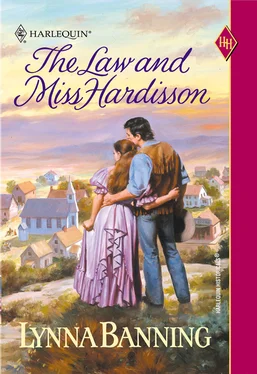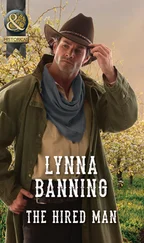He’d bet money it was Fortier who had winged him and then kicked in his ribs. All he remembered was the thump and sting of the bullet in his shoulder and waking up with his arm in a sling. Now, in addition to the warrant he carried for the outlaw, he had a personal score to settle. His crippled arm was his gun arm. It would be weeks, maybe months, before he could shoot straight.
He tossed back his chin-length black hair and ran his tongue over dry lips. He knew Fortier had passed this way; the outlaw’s trail led straight toward town. He lifted the reins and stepped his horse back from the cliff edge. “C’mon, Rebel. Time to go.”
Funny name, Crazy Creek. There was something he should remember about it, but he couldn’t recall what. Since the shooting, there were still things he couldn’t remember, but something about the place tugged at his insides. It was so pretty and serene it looked painted. Except for that boy down there, larruping through an alfalfa field after his dog, it hardly looked real.
He urged his mount forward, letting it pick its own way down the steep path. However out of place the trim little village made him feel, he’d have to ask around. If he was lucky, he’d pick up Fortier’s trail on the other side of town.
And if he wasn’t lucky…well, then, Fortier would shoot him in the back, like he’d shot Pa and Jannie, and that would be that. In some ways, it would be a relief.
Clayton’s lips twitched into a lopsided smile. He knew only one thing for certain—he would capture his father’s killer or die trying.
The look of the town below him, so settled, so civilized, made him nervous. Yeah, a white steeple town, full of people with refined manners and an extra helping of bigotry.
He pursed his mouth and tried to whistle. No way. He didn’t belong here.
Hell, what was new about that? Being half Cherokee meant he didn’t much belong anywhere.
“There,” Irene murmured in satisfaction. She rearranged the in-work file on the large oak desk and glanced approvingly at her well-organized office. It looked much more tidy since she’d washed the front windows and painted the rough pine walls. The sheriff wouldn’t mind. Besides, he was out of town.
Her office adjoined his, but he didn’t own the building. Nate Cummings, the undertaker, did.
She’d paid Nate three months’ rent in advance and the stocky gray-bearded man had let her do anything she wanted. She’d even spread a large oval braided rug over the plank floor. While Nate’s watery blue eyes had widened, he had snapped his mouth shut and said nothing.
“Crazy Creek never had no lawyer before,” Nate told her. She’d been famous ever since her first afternoon in town when she’d hung out the engraved metal sign she’d brought from the East and promptly got involved in that hostage standoff. Now her pending work file—actually the oval top from one of her hatboxes—overflowed with appointment requests. In the sheriff’s absence, she noted with a flush of pride, people turned to her for advice. They had waited years to settle property boundary questions, draw up wills, have marriages and births recorded. Townsfolk streamed into her office like spawning salmon.
On impulse, she moved to the window. Oh, how good it was to be here in the West! She never wanted to see Philadelphia again. She’d had enough of wealthy clients suing other wealthy clients over some Thoroughbred’s bloodlines. Real law—the constitutional rights she believed in with every fiber of her being—was needed in the West. Out here, the country was still growing. Back East, life—at least for her—had stopped when pneumonia took her father. After that, she couldn’t wait to leave.
Irene’s throat closed. She decided to busy herself dusting out her desk drawers. Settling herself on the hard oak swivel chair, she pulled open the bottom right-hand drawer and leaned over to inspect the contents. A dried-up bottle of Sanford’s ink, two dusty cigars, and—
The door banged open. “Where’s the sheriff?” a low, gravelly voice inquired.
“Gone,” Irene said without looking up. “Is there something I can—”
“Gone where?”
Irene raised her gaze to the doorway and stopped breathing. A tall man stood before her, one arm in a black cloth sling, his leather vest coated with trail dust, his tanned face impassive. Steady gray eyes held hers. “Gone where?” he prompted.
Irene jerked to attention. “Gone, um, gone—” She couldn’t think with him staring at her that way! “Gone…hunting!”
“Where’s this I. P. Hardisson, then? Sign says he’s a lawyer.”
“He is. I mean, I am! I am I. P. Hardisson.”
He looked her over for so long she felt tingles at the back of her neck. “Irene Pennfield Hardisson,” she supplied. Something about the man unnerved her, but she managed to keep her voice steady. “Attorney-at-law,” she added unnecessarily.
“Clayton Black, Texas Ranger.” His eyes still rested on hers, but he didn’t move. Tall and lean, he just stood and looked his fill.
“Mr. Black.” Irene extended her hand.
He gave her fingers a quick, hard shake with his left hand, then stuffed his hand into his back pocket. “You ever hear of anyone by the name of Fortier?”
“Brance Fortier?”
“That’s him. You know him?”
“N-not exactly.”
“Where is he?”
“I—he was in jail when I arrived in Crazy Creek—”
“Jail!”
“Yes, but they released him.”
“They what?” His eyes turned to cold steel.
“Well, I—he was accused of stealing a—”
“I’ll bet,” Clayton said in a dry voice. “Probably ran his own horse to death. So they let him go?”
It was more an accusation than a question. Irene’s resolve stiffened. “A man,” she pronounced in measured tones, “is presumed innocent until proven—”
“Horse-rocks!”
“Please let me finish.”
Clayton took two long steps forward and leaned over her desk. “Okay,” he said. “Finish.”
She blinked. His face was so close to hers she could see the flush of anger on his high cheekbones. Hair black as midnight swept his collar.
“—until proven guilty,” she concluded.
“Yeah, I’ve heard that. But what I want with Fortier hasn’t anything to do with horse-thievin’, so where do I find him?”
“I have no idea where he went after the hostage exchange.”
“Hostage exchange! Who was involved in that?”
“That you will have to ask the sheriff,” she replied with a sniff. She didn’t want to admit it was she who had negotiated the exchange. He looked mad enough as it was.
“Well now, I can’t do that now, can I? Seein’ as he’s gone ‘hunting.’ Just what is he hunting, Miss Hardisson?”
Something about the man’s deliberate, self-confident manner made her insides fluttery.
“I cannot say.”
“Can’t?” he pressed.
“Will not,” she amended. She had no legal leg to stand on, and she knew it. She swept the crumbling cigars into the wastebasket beside her desk and tried to think. For some reason she didn’t want to reveal to this man her role in Brance Fortier’s release. She looked him in the eye and shook her head.
“You’re obstructing justice, Miss Hardisson. I have a warrant for Fortier’s arrest.” With his good arm, he withdrew the paper from his inside vest pocket and unfolded it on her desk.
Irene scanned the document. “Murder! Oh, my.”
“So you see, ma’am, you’ve gone and put your legal foot right in the middle of my job, and I suggest—”
“This is Oregon, not Texas,” she enunciated with care. “Have you authority in Oregon?”
She prayed he would not challenge the point. She’d read law under her father in Pennsylvania; she hadn’t been out West long enough to know Oregon law.
Читать дальше












